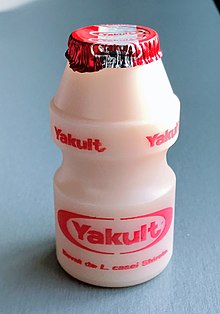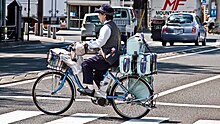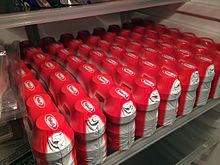| Revision as of 17:00, 1 October 2024 edit68.3.178.186 (talk)No edit summary← Previous edit | Revision as of 07:00, 20 November 2024 edit undo66.215.184.32 (talk) →History: Added author's name to reference.Next edit → | ||
| Line 53: | Line 53: | ||
| *In 1994, Yakult started being sold in Australia, Great Britain, and the United States.<ref name="guardian-cult">{{cite news |last1=Cocozza |first1=Paula |title=The cult of Yakult: the surprising reason the world's gone wild for the probiotic drink |url=https://www.theguardian.com/food/shortcuts/2018/sep/05/the-cult-of-yakult-the-surprising-reason-the-worlds-gone-wild-for-the-probiotic-drink |access-date=8 September 2018 |work=The Guardian |date=5 September 2018 |archive-date=7 September 2018 |archive-url=https://web.archive.org/web/20180907230019/https://www.theguardian.com/food/shortcuts/2018/sep/05/the-cult-of-yakult-the-surprising-reason-the-worlds-gone-wild-for-the-probiotic-drink |url-status=live }}</ref> | *In 1994, Yakult started being sold in Australia, Great Britain, and the United States.<ref name="guardian-cult">{{cite news |last1=Cocozza |first1=Paula |title=The cult of Yakult: the surprising reason the world's gone wild for the probiotic drink |url=https://www.theguardian.com/food/shortcuts/2018/sep/05/the-cult-of-yakult-the-surprising-reason-the-worlds-gone-wild-for-the-probiotic-drink |access-date=8 September 2018 |work=The Guardian |date=5 September 2018 |archive-date=7 September 2018 |archive-url=https://web.archive.org/web/20180907230019/https://www.theguardian.com/food/shortcuts/2018/sep/05/the-cult-of-yakult-the-surprising-reason-the-worlds-gone-wild-for-the-probiotic-drink |url-status=live }}</ref> | ||
| *In 2004 Yakult started being sold in New Zealand, via Australia. Yakult LIGHT was first available in Australia in 2004. In 2017, Yakult reformulated Yakult LIGHT to boast further reductions in sugar and energy content and to use ] instead of sugar.<ref>{{cite web | url=https://www.yakult.com.au/faqs/ | title=FAQ }}</ref> | *In 2004 Yakult started being sold in New Zealand, via Australia. Yakult LIGHT was first available in Australia in 2004. In 2017, Yakult reformulated Yakult LIGHT to boast further reductions in sugar and energy content and to use ] instead of sugar.<ref>{{cite web | url=https://www.yakult.com.au/faqs/ | title=FAQ }}</ref> | ||
| *In 2014, Yakult opened its first factory in the United States.<ref>{{cite news|url=https://www.fooddive.com/news/yakult-opens-probiotic-drink-factory-in-california/264784/|title=Yakult opens probiotic drink factory in California|date=20 May 2014|access-date=12 October 2023 }}</ref> | *In 2014, Yakult opened its first factory in the United States.<ref>{{cite news|url=https://www.fooddive.com/news/yakult-opens-probiotic-drink-factory-in-california/264784/|title=Yakult opens probiotic drink factory in California|date=20 May 2014|access-date=12 October 2023 |first1=Paul|last1=Conley|website=Food Dive}}</ref> | ||
| ===Relationship with Danone=== | ===Relationship with Danone=== | ||
Revision as of 07:00, 20 November 2024
This article is about the beverage. For the Japanese professional baseball team, see Tokyo Yakult Swallows.Sweetened probiotic milk beverage
 A single serving of Yakult A single serving of Yakult | |
| Type | Drink |
|---|---|
| Manufacturer | Yakult Honsha |
| Distributor | Yakult Honsha |
| Country of origin | Japan |
| Introduced | 1935 |
| Colour | Light peach |
| Ingredients | Ingredients |
Yakult (ヤクルト, Yakuruto) is a Japanese sweetened probiotic milk beverage fermented with the bacteria strain Lacticaseibacillus casei Shirota. It is sold by Yakult Honsha, based in Tokyo. The name "Yakult" was coined from jahurto, an Esperanto word meaning "yogurt".
Ingredients
Yakult's ingredients are water, skimmed milk, glucose-fructose syrup, sucrose, natural flavors (citrus), and live Lacticaseibacillus casei Shirota bacteria. The strain was originally classified as being Lactobacillus casei.
Yakult is prepared by adding glucose to skimmed milk and heating the mixture at 90 to 95 °C for about 30 minutes. After letting it cool down to 45 °C, the mixture is inoculated with the lactobacillus and incubated for 6 to 7 days at 37 to 38 °C. After fermentation, water, sugar, gums and lactic acid are added.
Health claims

In 2006, a panel appointed by the Netherlands Nutrition Center (Voedingscentrum) to evaluate a marketing request by Yakult found sufficient evidence to justify claims that drinking at least one bottle of Yakult per day might help improve bowel movements for people who tend to be constipated and might help maintain a healthy population of gut flora.
In 2010, a European Food Safety Authority (EFSA) panel denied a request by the company to market Yakult as defending the upper respiratory tract against pathogens (in other words, protection against diseases like the common cold), finding the claim not supported by the evidence.
In 2013, the UK Advertising Standards Authority disallowed an advertisement for Yakult in response to a complaint. It found that while there was sufficient evidence for the claim that "significant numbers of viable survived transit to the gut ", the advertisement had made claims of general health benefits without providing a specific, referenced claim, as required.
Marketing history


Yakult was invented in 1935 in Japan by Minoru Shirota, who helped found the company Yakult Honsha for the purpose of commercializing it. Although Yakult is sold in Japan in supermarkets and convenience stores, it is also sold door to door in Japan, Asia and in Latin America in convenience stores.
History
- In 1930, Scientist Minoru Shirota strengthened and cultured the Lactobacillus casei Shirota strain
- In 1935, Yakult started being made in Japan.
- In 1955, Yakult Honsha was founded.
- In 1963, Yakult began a home delivery service, using 'Yakult lady' employees.
- In 1964, Yakult began selling in other countries, beginning with Taiwan.
- In 1968, Yakult opens its first factory outside Japan in the city of São Bernardo do Campo, Brazil.
- In 1969, the Hong Kong Yakult Co Ltd was founded.
- In 1969, Korea Yakult was founded in South Korea.
- In 1981, Yakult ventured into Mexico, opening a factory in the city of Ixtapaluca under the direction of Carlos Kasuga.
- In 1994, Yakult started being sold in Australia, Great Britain, and the United States.
- In 2004 Yakult started being sold in New Zealand, via Australia. Yakult LIGHT was first available in Australia in 2004. In 2017, Yakult reformulated Yakult LIGHT to boast further reductions in sugar and energy content and to use Stevia instead of sugar.
- In 2014, Yakult opened its first factory in the United States.
Relationship with Danone
In February 2018, it was reported that Danone planned to sell US$1.9 billion of its Yakult investment, reducing its stake from 21% to 7%. The plan was followed by a decline in Yakult's share value. Danone had first bought shares in Yakult in April 2000. The sale was completed in March 2018.
In mass media
In September 2018, it was reported that the appearance of unlabelled Yakult bottles in the 2018 film To All the Boys I've Loved Before led to a rise in the drink's sales that coincided with a 2.8% increase in share price following the film's release on 17 August.
In January 2020, professional sumo wrestler Takakeishō Takanobu appeared in a television commercial advertising Yakult 1000.
See also
References
- ^ EFSA Panel on Dietetic Products, Nutrition and Allergies (October 2010). "Scientific Opinion on the substantiation of a health claim related to Lactobacillus casei strain Shirota and maintenance of the upper respiratory tract defence against pathogens by maintaining immune defences pursuant to Article 13(5) of Regulation (EC) N". EFSA Journal. 8 (10): 1860. doi:10.2903/j.efsa.2010.1860.
 Lay summary: Wallop, Harry (20 October 2010). "Probiotic drinks do not aid health, Europe says". The Telegraph. Archived from the original on 12 January 2022.
Lay summary: Wallop, Harry (20 October 2010). "Probiotic drinks do not aid health, Europe says". The Telegraph. Archived from the original on 12 January 2022.
- "Yakult product information and nutrition facts". Yakult U.S.A. Inc. 19 December 2015. Archived from the original on 7 September 2018. Retrieved 31 January 2023.
- Jost, Rolf (2007), "Milk and Dairy Products", Ullmann's Encyclopedia of Industrial Chemistry (7th ed.), doi:10.1002/14356007.a16_589.pub3, ISBN 978-3527306732
- "Assessment Report: Yakult". Netherlands Nutrition Centre. 10 November 2006. Archived from the original on 8 September 2018. Retrieved 7 September 2018.
- "ASA Adjudication on Yakult UK Ltd". Advertising Standards Authority. 15 May 2013. Archived from the original on 8 September 2018. Retrieved 8 September 2018.
- Caramia, Giuseppe; Silvi, Stefania (2011). "Chapter 1: Probiotics: From the Ancient Wisdom to the Actual Therapeutical and Neutraceutical Perspective". In Malago, Joshua J.; Koninkx, Jos. F. J. G.; Marinsek-Logar, R. (eds.). Probiotic Bacteria and Enteric Infections Cytoprotection by Probiotic Bacteria. Dordrecht: Springer Science & Business Media. p. 6. ISBN 978-9-4007-0386-5. Archived from the original on 17 March 2023. Retrieved 8 September 2018.
- "Yakult Probiotic Drink: Bottled Gut Health Magic". Prosperopedia.com. 8 March 2021.
- ^ Ryall, Julian (11 November 2018). "The Yakult story: Japanese health drink that conquered world with beneficial bacteria and beaming ladies". The Star. Archived from the original on 13 November 2019. Retrieved 13 November 2019.
- "Origem - Yakult Brasil". Archived from the original on 20 October 2019. Retrieved 6 May 2022.
- "Hong Kong Yakult Co Ltd". Facebook. Archived from the original on 17 March 2023. Retrieved 15 December 2019.
- "야쿠르트 - 윤덕병". 30 September 2018. Archived from the original on 10 December 2021. Retrieved 10 December 2021.
- Bretón, Ángeles (21 May 2022). "Yakult: cuatro décadas de arraigo en Puebla". El Universal Puebla (in Spanish). Archived from the original on 17 January 2023. Retrieved 17 January 2023.
- Cocozza, Paula (5 September 2018). "The cult of Yakult: the surprising reason the world's gone wild for the probiotic drink". The Guardian. Archived from the original on 7 September 2018. Retrieved 8 September 2018.
- "FAQ".
- Conley, Paul (20 May 2014). "Yakult opens probiotic drink factory in California". Food Dive. Retrieved 12 October 2023.
- Kar-Gupta, Sudip; Vidalon, Dominique (14 February 2018). "Danone to sell $1.9 billion Yakult stake in quest to boost shareholder returns". Reuters. Archived from the original on 8 September 2018. Retrieved 8 September 2018.
- "Danone to Sell Stake in Japan's Yakult for $1.9 Billion". Bloomberg. 14 February 2018. Archived from the original on 9 September 2018. Retrieved 8 September 2018.
- ^ Gretler, Corinne (14 February 2018). "Yakult Declines After Danone's $1.9 Billion Share Sale Plan". Bloomberg. Archived from the original on 5 September 2018. Retrieved 8 September 2018.
- "Danone completes 1.3bn euro sale of its 14% stake in Yakult". FoodBev Media. 28 March 2018. Archived from the original on 8 September 2018. Retrieved 8 September 2018.
- Petter, Olivia (4 September 2018). "Yakult shares increase following release of Netflix's 'To All the Boys I've Loved Before'". The Independent. Archived from the original on 7 May 2022. Retrieved 8 September 2018.
- Balji, Divya (3 September 2018). "Netflix Teen Comedy Helps Yakult Yogurt Drink Fly Off Shelves". BloombergQuint. Archived from the original on 8 September 2018. Retrieved 8 September 2018.
- "貴景勝「熱いお風呂ダメ」ダチョウ倶楽部の勧誘断る - 大相撲 : 日刊スポーツ". Nikkan Sports. 19 December 2019. Retrieved 11 November 2023.
- "貴景勝 関がテレビCM初出演!!「Yakult(ヤクルト)1000」の新CMがスタート!!" (PDF) (in Japanese). Yakult Honsha. 17 January 2020. Retrieved 11 November 2023.
External links
| Japanese food and drink | |||||||||
|---|---|---|---|---|---|---|---|---|---|
| Shushoku |
| ||||||||
| Okazu | |||||||||
| Soup (Shirumono) | |||||||||
| Set menu | |||||||||
| Beverages |
| ||||||||
| Snacks / desserts/ Wagashi | |||||||||
| Fruits | |||||||||
| Ingredients / condiments | |||||||||
| Utensils | |||||||||
| Lists | |||||||||
| Related | |||||||||
| Milk | ||
|---|---|---|
| Source |  | |
| Types | ||
| Products | ||
| Containers | ||
| Topics | ||